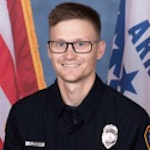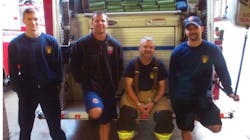On day one of my career, my crew delivered a baby. Morning truck checks were underway, the tones went off and the roller coaster of emotions that everyone has their first day on shift were already there.
As dispatch went through the details, where we were headed and how we were needed, I sat overwhelmed, not knowing what to expect or what to do. I had little familiarity with the crew and looked to them for guidance on what to do and how to do it. My questions were met with understanding, calm and level-headed responses. These guys knew their jobs and knew how to take care of the people around them, 911 callers and firefighters alike. In that moment, they displayed characteristics of dependability. They set the tone for me as a new firefighter.
Across the fire service, we gravitate toward people like this, the ones seen putting the work in, the ones who love what we are blessed to be a part of, and the ones that are successful and dependable.
My journey in the fire service started just under seven years ago with a small volunteer fire department. In my time there, I was lucky enough to be promoted to the rank of Captain and assume the role of Training Officer. I immediately fell in love with the fire service and everything it has to offer, and I began pursuing a career in it. I have now been a career firefighter for close to five years, and that has come with some incredible opportunities.
Through my growth within each organization and the teams I am a part of, one thing stands out: the manual on how to move between day one to dependable doesn’t exist. As a probationary firefighter, there is no shortage of books, videos or articles that serve as road maps to help you to tackle that portion of your career in the best ways possible. Whether it’s time on the job, your department getting young, or whatever else places you into this unique role, you then become a firefighter with seniority. There is a significant gap between probationary and senior firefighters. Why is it that the tools, while readily available for those positions, are scarce when it comes to the transition between them?
To start, we must differentiate between senior and dependable. The definition of a “senior firefighter” varies depending on department, state, region, etc., and in some places, it’s a position that you gain via promotion. How does “dependable” differ? Is this accomplished by time on the job, experience and knowledge, or is it a combination of these and other less tangible things? A dependable firefighter is a go-to firefighter who is solid in their job, can be counted on to get things done, and takes time to invest in others and serve as a mentor. Someone who takes their success and their failures, all the things that have shaped them into who they are as a firefighter, and passes them along.
A company officer I worked for explained it best: “The priority of the dependable firefighter should be to take everything they know and invest it into the men and women below them, members with less time, experience, and knowledge than they have”.
The goal of a dependable firefighter is to make sure the person who succeeds them knows everything they know about their job when they step into that position. By doing so, the knowledge base grows and we can build on and learn from our predecessors. I’ve been fortunate enough to experience this firsthand. I have worked for and with top-notch people in every rank, people that know their jobs inside and out and that make it a priority to teach, train with, and invest in others. They made me a better firefighter.
So, how do we successfully become that dependable firefighter? The list of things that you or others use to measure success or effectiveness can be endless. Let’s start with opportunities.
Opportunities you are presented with can be a great way to measure success. Sometimes you’re just lucky; you’re in the right place at the right time, and it is essential to deliver in these moments. This can materialize as committees, specialized teams, deployments, etc. The goal, however, should be for opportunities to recur. Whether the initial opportunity came by chance, assignment, necessity or qualification, the continuation of these opportunities is the ultimate compliment. It shows what you bring to the table is respected, valued and dependable.
Respect, like the continuation of opportunities, should be measured by performance. In the beginning, being liked can be misconstrued as respect. People want to work with you. That’s a great thing, but is that because you’re only fun to be around or is it a combination of sociability, trust and job proficiency. Respect is necessary, just ensure that it is respect that is earned. Be the person that is honest with themselves, the one that doesn’t have a case of overconfidence. Pursue respect by working hard, making yourself better and connecting with your fellow firefighters. Above all, always work harder than you think you have to!
Awards, also, are great ways for people to be recognized for their contributions, but ask yourself this: Would any of your peers have acted differently? Awards are great and often much deserved, but be careful measuring your success based on praise. We are only as good as those above, below and beside us. Dependable firefighters know this. They are the people that put it all on the line and can always be counted on, the people that make the job and the department better. This does not change, regardless of awards or acknowledgement.
The list goes on. Your fire chief may be looking at your work towards promotion or whether you volunteer to be a part of committees for the betterment of the department. Your shift commander might look at your dependability by recognizing you and your crew as the go-to group for things on-scene that aren’t making sense, knowing they can send you in and that you will figure out how to fix a problem. Your company officer may measure your success by how comfortable they are sending you for stand-alone tasks, knowing that they do not need to be there to look over your shoulder and that you will be successful and efficient.
The real measure of success, though, is a personal thing. What do you want to achieve and are you working to do so while making everyone else around you better in the process? Even with this, we still need a clear understanding of our company’s and department’s definitions of success and how all these align to build a top-notch, dependable firefighter.

Jake Blackburn
Jake Blackburn started his career as a volunteer firefighter with the Wedington Volunteer Fire Department in Northwest Arkansas where he has served for seven years. He currently holds the rank of Captain and Training Officer for WVFD.
In 2015, Jake was hired by the Fayetteville Fire Department where he now rides as a firefighter for the city's Rescue Company. He is also a member of Arkansas Task Force 1 and the Arkansas Helicopter Rescue Team.






